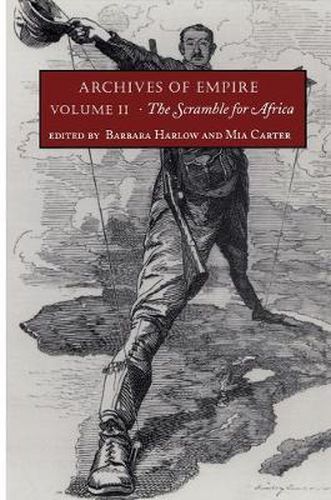Readings Newsletter
Become a Readings Member to make your shopping experience even easier.
Sign in or sign up for free!
You’re not far away from qualifying for FREE standard shipping within Australia
You’ve qualified for FREE standard shipping within Australia
The cart is loading…






This title is printed to order. This book may have been self-published. If so, we cannot guarantee the quality of the content. In the main most books will have gone through the editing process however some may not. We therefore suggest that you be aware of this before ordering this book. If in doubt check either the author or publisher’s details as we are unable to accept any returns unless they are faulty. Please contact us if you have any questions.
A collection of primary materials, the multivolume Archives of Empire provides a documentary history of 19th-century British imperialism from the Indian subcontinent to the Suez Canal to southernmost Africa. Barbara Harlow and Mia Carter have carefully selected a diverse range of texts that track the debates over imperialism in the ranks of the military, the corridors of political power, the lobbies of missionary organizations, the halls of royal geographic and ethnographic societies, the boardrooms of trading companies, the editorial offices of major newspapers, and far-flung parts of the empire itself. Focusing on a particular region and historical period, each volume in Archives of Empire is organized into sections preceded by brief introductions. Documents including mercantile company charters, parliamentary records, explorers’ accounts, and political cartoons are complemented by timelines, maps, and bibliographies. Unique resources for teachers and students, these volumes reveal the complexities of 19th-century colonialism and emphasize its enduring relevance to the global markets of the 21st-century. While focusing on the expansion of the British Empire, The Scramble for Africa illuminates the intense 19th-century contest between European nations over Africa’s land, people, and resources. Highlighting the 1885 Berlin Conference in which Britain, France, Germany, Portugal, and Italy partitioned Africa among themselves, this collection follows British conflicts with other nations over different regions as well as its eventual challenge to Leopold of Belgium’s rule of the Congo. The reports, speeches, treatises, proclamations, letters, and cartoons assembled here include works by Henry M. Stanley, David Livingstone, Joseph Conrad, G.W.F. Hegel, Winston Churchill, Charles Darwin, and Arthur Conan Doyle. A number of pieces highlight the proliferation of companies chartered to pursue Africa’s gold, diamonds, and oil, particularly Cecil J. Rhodes’s British South Africa Company and Frederick Lugard’s Royal Niger Company. Other documents describe debacles on the continent - such as the defeat of General Gordon in Khartoum and the Anglo-Boer War - and the growing criticism of imperial maneuvers by proto-human rights activists including George Washington Williams, Mark Twain, Olive Schreiner, and E.D. Morel.
$9.00 standard shipping within Australia
FREE standard shipping within Australia for orders over $100.00
Express & International shipping calculated at checkout
This title is printed to order. This book may have been self-published. If so, we cannot guarantee the quality of the content. In the main most books will have gone through the editing process however some may not. We therefore suggest that you be aware of this before ordering this book. If in doubt check either the author or publisher’s details as we are unable to accept any returns unless they are faulty. Please contact us if you have any questions.
A collection of primary materials, the multivolume Archives of Empire provides a documentary history of 19th-century British imperialism from the Indian subcontinent to the Suez Canal to southernmost Africa. Barbara Harlow and Mia Carter have carefully selected a diverse range of texts that track the debates over imperialism in the ranks of the military, the corridors of political power, the lobbies of missionary organizations, the halls of royal geographic and ethnographic societies, the boardrooms of trading companies, the editorial offices of major newspapers, and far-flung parts of the empire itself. Focusing on a particular region and historical period, each volume in Archives of Empire is organized into sections preceded by brief introductions. Documents including mercantile company charters, parliamentary records, explorers’ accounts, and political cartoons are complemented by timelines, maps, and bibliographies. Unique resources for teachers and students, these volumes reveal the complexities of 19th-century colonialism and emphasize its enduring relevance to the global markets of the 21st-century. While focusing on the expansion of the British Empire, The Scramble for Africa illuminates the intense 19th-century contest between European nations over Africa’s land, people, and resources. Highlighting the 1885 Berlin Conference in which Britain, France, Germany, Portugal, and Italy partitioned Africa among themselves, this collection follows British conflicts with other nations over different regions as well as its eventual challenge to Leopold of Belgium’s rule of the Congo. The reports, speeches, treatises, proclamations, letters, and cartoons assembled here include works by Henry M. Stanley, David Livingstone, Joseph Conrad, G.W.F. Hegel, Winston Churchill, Charles Darwin, and Arthur Conan Doyle. A number of pieces highlight the proliferation of companies chartered to pursue Africa’s gold, diamonds, and oil, particularly Cecil J. Rhodes’s British South Africa Company and Frederick Lugard’s Royal Niger Company. Other documents describe debacles on the continent - such as the defeat of General Gordon in Khartoum and the Anglo-Boer War - and the growing criticism of imperial maneuvers by proto-human rights activists including George Washington Williams, Mark Twain, Olive Schreiner, and E.D. Morel.